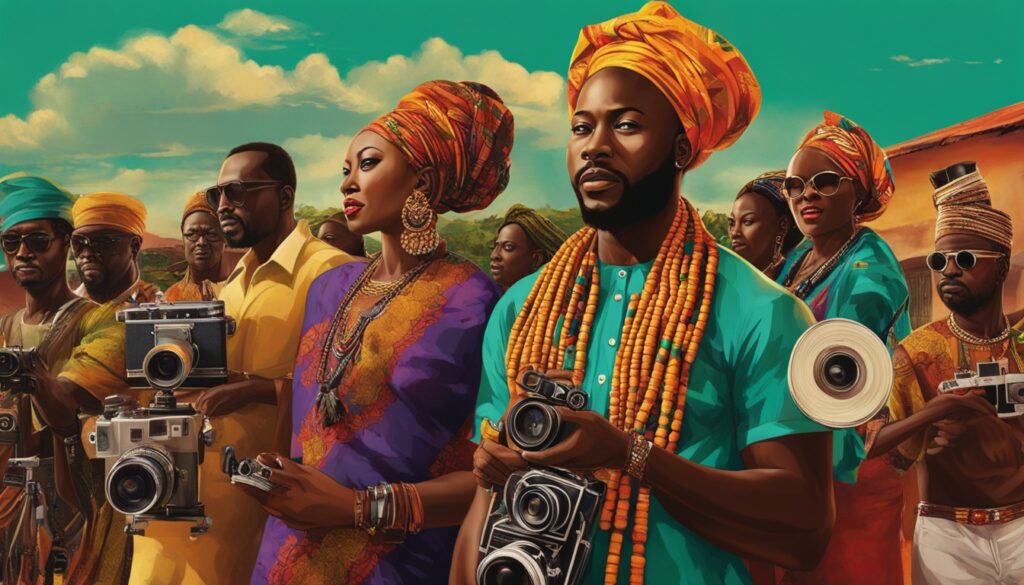Nollywood, the vibrant Nigerian film industry, has firmly established itself as a force to be reckoned with in the global entertainment landscape. Producing over 2,000 movies annually and employing thousands of people, this thriving hub of cinematic creativity is the epicenter of West African cinema, located in the bustling city of Lagos, Nigeria’s commercial capital. Nollywood’s rise to prominence is a testament to the country’s rich cultural heritage, captivating storytelling traditions, and technological advancements, making it a dynamic and influential player on the international stage.
Key Takeaways
- Nollywood is the thriving film industry in Nigeria, producing over 2,000 movies annually.
- The Nigerian film industry is the epicenter of West African cinema, located in the commercial capital of Lagos.
- Nollywood’s success is rooted in Nigeria’s cultural heritage, storytelling traditions, and technological advancements.
- Nollywood has emerged as a significant player in the global entertainment landscape.
- This article explores the various facets of Nollywood and its impact on Nigerian and West African cinema.
Introduction to Nigerian Cinema
The Nigerian film industry, often referred to as Nollywood, has witnessed a remarkable rise over the past few decades. Nollywood’s origins can be traced back to the early 1990s, when filmmakers began to embrace the video format as a more affordable alternative to traditional celluloid. The landmark film “Living in Bondage,” produced by Ken Nnabue in 1992, is widely regarded as the catalyst that sparked the Nollywood revolution.
Emergence of Nollywood
The shift to video-based filmmaking in Nigerian cinema has allowed for greater creative expression and cultural representation, drawing on the rich Yoruba storytelling traditions and incorporating elements of Pidgin English, local dialects, and African spirituality. The emergence of Nollywood has transformed the way Africans tell their stories, becoming a cultural and technological hybrid that reflects the diverse facets of Nigerian society.

The video format in filmmaking has enabled Nollywood to thrive, providing a more accessible and cost-effective platform for Nigerian filmmakers to create and distribute their works. This, in turn, has led to a surge in the cultural representation of Nigerian films, as they often explore themes and narratives that resonate with the Nigerian and broader African audiences.
Historical Development of Nigerian Film Industry
The history of the Nigerian film industry, often referred to as Nollywood, can be traced back to the early 20th century. The evolution of this dynamic sector can be divided into four distinct periods: the colonial period, the independence period, the indigenization period, and the Nollywood era.
During the colonial period from 1903 to 1960, film was primarily used as a tool for political and colonial propaganda. The colonialists set up mobile cinema vans to showcase documentary and educational films, shaping the early narrative of the industry. As Nigeria gained independence in 1960, the Nigerian Federal and States Film Unit continued this model, focusing primarily on documentary and newsreel content.
The indigenization period, marked by the Indigenization Decree of 1972, aimed to give exclusive rights of film distribution to Nigerians. However, foreign influences, particularly from Lebanese and Indian distributors, continued to dominate the industry. This period saw a gradual shift towards more localized content, laying the groundwork for the emergence of the Nollywood era.
The Nollywood period, beginning in the 1990s, marked a significant turning point in the history of the Nigerian film industry. The availability of affordable video technology and the growing demand for home entertainment allowed for the rise of Nigerian-made films that reflected the country’s rich cultural heritage and storytelling traditions. This period has witnessed the exponential growth of the industry, transforming it into a global phenomenon.

Nollywood: A Cultural Hybrid
Nollywood, the vibrant Nigerian film industry, is a remarkable cultural hybrid that seamlessly blends Nigerian cultural traditions with diverse cinematic genres. The Nollywood films are deeply rooted in the social fabric, folklore, and community life of Nigeria, showcasing a rich tapestry of storytelling.
The common Nollywood genres, ranging from horror and comedy to urban legends, myths, love stories, and historical epics, often incorporate African idioms, proverbs, costumes, artifacts, and imagery. This cultural integration allows Nollywood to serve as a powerful medium for preserving and disseminating Nigerian cultural heritage.
Moreover, Nollywood’s cultural hybridity extends beyond the borders of Nigeria, with its influence reaching the African diaspora and shaping cultural representations and perceptions of African identity. The industry has played a significant role in the exploration and representation of African religions, particularly traditional belief systems and practices, further reinforcing its status as a cultural hybrid.
Through this unique blend of Nigerian cultural traditions and diverse cinematic forms, Nollywood has emerged as a distinctive and influential voice in the global entertainment landscape, captivating audiences worldwide with its authentic and engaging storytelling.

Nigeria: West African Film Studies Lagos Nigeria
Lagos, the commercial capital of Nigeria, has emerged as the epicenter of West African cinema, serving as the vibrant hub for the Nollywood film industry. The city’s thriving film culture has attracted scholars and researchers from around the world to engage in the study of Nigerian cinema, exploring its cultural significance, technological advancements, and global impact.
Film studies in Lagos have become a critical field of academic inquiry, with universities and research institutions establishing programs and centers dedicated to the analysis and preservation of Nollywood’s rich cinematic heritage. This growing academic interest reflects the industry’s importance as a cultural and artistic expression of Nigeria, as well as its influence on the wider African and global film landscapes.
The cultural significance of Nollywood, Nigeria’s prolific film industry, cannot be overstated. Nollywood’s movies have become a powerful medium for storytelling, showcasing the nation’s diverse cultural traditions, sociopolitical issues, and the lived experiences of its people. The impact of Nollywood on the global film industry is also undeniable, as the industry’s unique production techniques, distribution models, and narrative styles have inspired and influenced filmmakers worldwide.
As the epicenter of West African cinema, Lagos continues to be a hub of innovation and creativity, attracting talent from across the region and beyond. The city’s film studies programs and research centers play a vital role in shaping the discourse around Nollywood, ensuring that the industry’s legacy and impact are duly recognized and celebrated on the global stage.
Technological Hybridity in Nollywood
Nollywood, the vibrant Nigerian film industry, has undergone a remarkable technological transformation that has propelled its growth and global reach. At the heart of this technological hybridity is the industry’s embrace of the video format as a more cost-effective alternative to traditional celluloid filmmaking. This shift has allowed Nollywood filmmakers to churn out thousands of films annually, meeting the insatiable demand for content.
Video Format and Editing Techniques
The transition from celluloid to video-based production has been a game-changer for Nollywood. Filmmakers have readily adopted digital video cameras, which offer greater accessibility and faster turnaround times compared to the laborious celluloid process. This technological shift has empowered Nollywood to produce content at a breakneck pace, catering to the diverse tastes of its vast audience.
Alongside the embrace of video formats, Nollywood filmmakers have also integrated contemporary digital editing techniques and software into their workflow. These tools enable them to enhance the visual quality and production value of their films, ensuring a more polished and immersive viewing experience for audiences. The use of these digital filmmaking techniques has been a crucial factor in the growing sophistication and global appeal of Nollywood productions.
The distribution of Nollywood films has also evolved, with movies being widely available on various platforms, including DVDs, VCDs, and online streaming. This technological hybridization has been a crucial factor in the growth and global reach of the Nigerian film industry, allowing Nollywood to captivate audiences both at home and abroad.

Impact and Popularity of Nollywood
Nollywood, the vibrant Nigerian film industry, has had a remarkable impact both within the country and across the global stage. The industry has become a significant employer, providing economic opportunities for thousands of Nigerians and contributing substantially to the nation’s GDP. Nollywood’s popularity has transcended the borders of Nigeria, with its films being widely consumed throughout Africa and the African diaspora.
For many Nigerians and Africans living abroad, Nollywood films serve as a cultural connector, allowing them to maintain a strong link to their heritage and traditions. The industry has played a crucial role in the preservation and representation of Nigerian and African cultural identity, showcasing the diverse stories, languages, and perspectives that exist within the continent.
Nollywood’s global reach has been a testament to the power of storytelling and the universal appeal of its content. The industry’s films have not only entertained audiences but have also served as a platform for amplifying African voices and narratives on the global stage. As Nollywood continues to evolve and expand, its impact on the cultural preservation and representation of Nigeria and Africa is likely to become even more profound.
Criticism and Challenges
Despite Nollywood’s remarkable success and widespread popularity, the Nigerian film industry has faced its fair share of criticism and obstacles. One recurring issue is the excessive emphasis on the supernatural, juju, and melodramatic storylines in many Nollywood films, which some have criticized for perpetuating unrealistic portrayals of Nigerian society.
Additionally, concerns have been raised about the overall quality and production value of certain Nollywood films. While the industry’s rapid growth has enabled the creation of a vast volume of content, questions have emerged about Nollywood’s ability to maintain high standards amidst this rapid expansion.
Recurring Themes and Unrealistic Portrayals
The criticism of Nollywood often focuses on the recurring themes and unrealistic portrayals that are prevalent in many of the industry’s films. The excessive emphasis on the supernatural and juju, for instance, has been viewed by some as reinforcing negative stereotypes and misrepresenting the realities of Nigerian culture.
Similarly, the melodramatic and sensationalized storylines in some Nollywood productions have been criticized for failing to accurately reflect the nuances and complexities of Nigerian society. These challenges faced by Nollywood highlight the need for a greater focus on storytelling, production quality, and cultural authenticity.
Nonetheless, Nollywood filmmakers and industry professionals are actively working to address these concerns, recognizing the importance of improving the overall quality and relevance of Nollywood films. As the industry continues to evolve, the goal is to strike a balance between commercial success and artistic integrity, ensuring that Nollywood’s cinematic offerings resonate more authentically with both local and global audiences.
Future Prospects and Global Recognition
As the Nollywood film industry continues to evolve, it holds immense promise for the future. Filmmakers are increasingly embracing technological advancements, such as the use of digital cameras and sophisticated editing software, to enhance the visual quality and production value of their films. This technological progress has significantly improved the overall cinematic experience for audiences, both within Nigeria and across the globe.
Moreover, Nollywood’s global recognition has been steadily growing, with its films being showcased at prestigious international film festivals and distributed through various digital platforms. This increased visibility and accessibility have the potential to open new avenues for collaboration, funding, and creative exchange, further solidifying Nollywood’s position within the global film landscape.
The future of Nollywood also holds the promise of continued innovation, captivating storytelling, and the preservation of cultural heritage. As the industry continues to evolve, it is poised to play an increasingly influential role in the development and growth of African cinema, inspiring a new generation of filmmakers and captivating audiences around the world.
Conclusion
Nigeria’s West African Film Studies in Lagos has emerged as a crucial field of study, reflecting the profound impact and significance of the Nollywood film industry. From its humble beginnings in the early 1990s to its current status as a global cinematic force, Nollywood has demonstrated the power of cultural expression and technological hybridization.
The industry’s rise has been fueled by its deep-rooted connection to Nigerian and African cultural traditions, as well as its ability to adapt to changing technological landscapes. Despite facing criticism and challenges, Nollywood continues to evolve, showcasing the resilience and innovative spirit of Nigerian filmmakers. As Nollywood gains greater global recognition, the future holds immense potential for the industry to further cement its place as a driving force in the development of African cinema, preserving and sharing the diverse narratives and cultural heritage of the continent.
The summary of key points highlights the significance of Nigeria: West African Film Studies Lagos Nigeria, as well as Nollywood’s impact and future prospects. The industry’s cultural hybridity, technological advancements, and global recognition are all crucial factors that contribute to its enduring legacy and the continued exploration of African cinema.
Source Links
- Fundamentalist Rhetoric 1 – https://www-s3-live.kent.edu/s3fs-root/s3fs-public/file/12-uchenna-Onuzulike.pdf
- Nollywood: A Case Study of the Rising Nigerian Film Industry- Content & Production – https://opensiuc.lib.siu.edu/cgi/viewcontent.cgi?article=1667&context=gs_rp
- FILM IN NIGERIA, by Hyginus Ekwuazi – https://africaworldpressbooks.com/film-in-nigeria-by-hyginus-ekwuazi/


